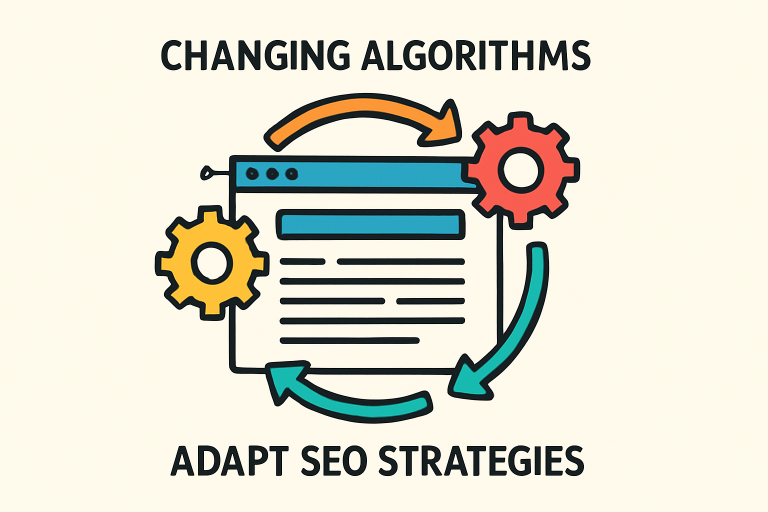Introduction
In the dynamic landscape of digital marketing, staying ahead of evolving search engine algorithms is crucial for achieving sustainable growth. Search engines like Google update their systems frequently, altering the algorithms that determine what content appears at the top of users’ search results pages. Businesses that invest in up-to-date, data-driven SEO strategies are better positioned to outperform competitors and adapt quickly to changes. Partnering with an Austin SEO agency can help organizations develop adaptive methodologies that endure and succeed in this unpredictable environment. Focusing only on keywords and backlinks is no longer sufficient for lasting search visibility. Success today requires a holistic SEO approach that prioritizes technical health, user experience, and high-quality, relevant content. By prioritizing users and maintaining a future-focused strategy, businesses can sustain consistent organic traffic despite algorithm updates. A strong SEO plan is dynamic, combining performance analysis, reliable resources, and up-to-date best practices to ensure long-term growth and resilience.
Why Search Engine Algorithms Keep Changing
- Increase relevance and quality of search results
- Combat spam and manipulative tactics
- Respond to changing user behaviors and expectations
Search algorithms are continually refined to reflect how real users seek information online. Major updates often target sites that use manipulative tactics, while promoting pages designed with genuine user value in mind. By continuously evolving, search engines combat spam, boost trust, and improve the overall quality of the digital ecosystem.
Core Components of Effective SEO
- On-page elements: title tags, meta descriptions, keyword placement
- High-quality, helpful content
- Site speed and technical health
- Backlink profile and domain authority
Mastering SEO basics like keyword optimization, technical audits, and authoritative backlinks boosts your digital visibility. Regular focus on these essentials helps protect your site from fluctuations caused by search algorithm updates.
Prioritizing Content Relevance and Quality
Content remains king, but now it’s crucial how well it addresses the core questions of real users. Google’s recent emphasis on “helpful content” favors pages that directly target user intent with clear, insightful, and thorough information. Studies show that top-ranking pages offer more than just basic facts; they provide detailed solutions, examples, and insights, satisfying searcher needs both broadly and specifically.
The Role of User Experience in SEO
User experience (UX) is now deeply intertwined with search rankings. Factors such as page speed, mobile responsiveness, and intuitive navigation are essential to modern SEO, particularly since Google’s Core Web Vitals update. Websites that load quickly, function smoothly on any device, and make content easy to find see lower bounce rates and higher engagement—two signals that search engines reward. A focus on accessible design is also key to maximizing reach and inclusivity for all users.
Building a Data-Driven SEO Strategy
- Track organic keywords and rankings with analytics tools
- Monitor site traffic, bounce rates, and user engagement
- Adjust content and technical SEO based on real data
Data-driven decision-making is at the heart of sustainable SEO performance. Google Analytics, Search Console, and third-party platforms enable businesses to track everything from individual keyword movements to shifts in user interaction. The interpretation of this data supports ongoing optimization efforts, eliminating guesswork and increasing the effectiveness of every update.
Technical SEO: Don’t Ignore Site Health
- Ensure mobile-friendliness across devices
- Monitor for crawl errors and 404s
- Optimize XML sitemaps and robots.txt
A technically sound website is the foundation for all other SEO improvements. Mobile usability, error-free sitemap configuration, and robust robots.txt files ensure seamless crawling and indexing by search engines. Frequent site health audits using tools from trusted sources, such as those found in Search Engine Journal guides, not only address immediate issues but also prepare your site for future algorithm changes, thereby greatly reducing risk and maintaining rankings. Regular monitoring helps identify potential bottlenecks before they affect performance. Investing time in technical SEO ultimately enhances user experience and strengthens long-term search visibility.
Preparing for the Future of Search
Prepare for the next evolution of search by keeping your strategies flexible and rooted in the user experience. Advancements in artificial intelligence, conversational search, and multimodal queries will continue to shape the field of SEO. Voice search optimization, structured data, and an adaptive approach will future-proof your efforts. Reports project that SEO’s role as an acquisition channel will only increase, making future readiness a competitive differentiator.
Conclusion
As search engine algorithms evolve, businesses that prioritize value and adapt to new standards maintain their digital advantage. Focusing on relevance, user experience, and technical integrity, supported by transparent performance data, ensures that your SEO strategy isn’t just built for today but is equipped to withstand whatever changes tomorrow may bring. Ongoing education, agile optimization, and a commitment to users are the defining traits of those who succeed in organic search for the long term.
